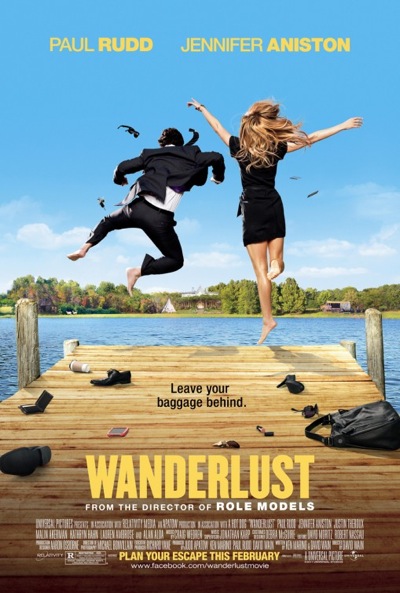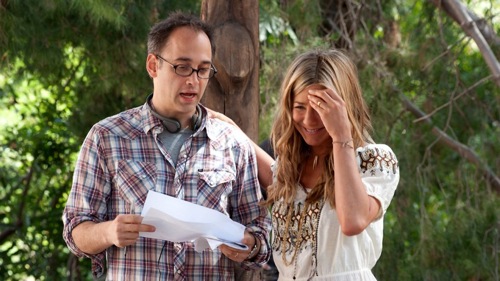
How much do we love David Wain here at AICN? How 'bout three-interviews-in-three-consecutive-weeks... um, much?
Whereas Capone's recent conversations with the wit behind WET HOT AMERICAN SUMMER, ROLE MODELS and the web series WAINY DAYS were wide-ranging, this brief chat is focused almost entirely on his latest film, WANDERLUST, which finds Wain smuggling a good deal of absurdist humor into what is basically a studio comedy. If you read my interviews with Paul Rudd and co-writer Ken Marino, you know that there is a scene in which Rudd psyches himself up for an bout of extramarital whoopee by frantically expounding on his "erection selection". It's an insanely protracted sequence, and, in the way it unnerves as much as it amuses, classic Wain. It's the kind of bit I expect from WAINY DAYS, not a studio-financed film playing in over 2,000 theaters.
If you dig off-center humor, you need to get out and see WANDERLUST while it's still in theaters. Studios would much rather make low-risk, cookie-cutter comedies directed by paycheck-cashing stooges who'll incorporate every executive note passed their way, and when a film like this underperforms, it confirms their belief that audiences want no part of something slightly unusual. Wain's film may go off on a few nutty tangents, but it's never inaccessible (mostly because Rudd seems like a regular guy even when he's freaking out in front of a mirror).
In the below interview, I asked Wain about his sensibility, and how he was able to incorporate more of it in WANDERLUST. We also talked about his creative partnership with Marino and, of course, the shrouded-in-mystery WET HOT AMERICAN SUMMER.

Mr. Beaks: Last time I talked to you, you said that ROLE MODELS was about as far away from your sensibility as you could get while still being comfortable. Feel free to disagree, but I think this film is much more your sensibility.
David Wain: Well, this movie had a very different gestation. This is a script that Ken and I wrote ourselves from scratch, whereas ROLE MODELS was something we came onto a couple of months before shooting. From the get-go, this was our thing. In fact, it was almost the opposite of ROLE MODELS: we had our own movie that we had intended to make as a smaller, more personal film, and then when we took it to Universal. That's when we expanded the scope to make it more of a studio film. On ROLE MODELS, we went into a very studio film and gave it a little bit of our flavor.
Beaks: In expanding WANDERLUST, were you worried about losing elements you really liked about that smaller idea?
Wain: Not really. Maybe "expanding" isn't the right word. We brought in Judd Apatow to help find the emotional core to it and make it really funny with us. We wanted a producer who would push us to do our best work. We didn't make a lot of changes to it that were specifically "Let's make it more of a studio film"; we just tried to find ways to make it better.
Beaks: When you and Ken get together to write, you've said you just like to go in a room for fixed hours and go at it day-in and day-out until you have a finished script. How intense are those writing periods, and has your relationship with Ken changed over twenty-plus years of doing this?
Wain: Those writing periods are really fun because you've made arrangements to shut out the rest of the world. We just sit there and think and write and order some food. It's fun to do something very concentrated and not have to be distracted by a million other things that have to be done. And the relationship has changed just in that we've learned to work together, and we've learned systems to work together more efficiently. But we're still friends like we were when we were eighteen. It's more not changed than changed.
Beaks: How harmonious is that process? While you're driving towards the same goal, I imagine there are differences of opinion. How do you settle those?
Wain: It's a lot of just something we learned on THE STATE among eleven people. And when you've had to find consensus with eleven people, two people seems much easier. We just talk through things basically; if we disagree on something, we talk it through until one convinces the other, or we table it until the next time. Sometimes, the question at hand becomes irrelevant by the next week, and sometimes we say, "We'll just have both for now." But we just find ways to work through disagreements, but hopefully not get too bogged down and paralyzed.
Beaks: When this project was first announced, a lot of us couldn't help but draw parallels between WANDERLUST and LOST IN AMERICA - on a conceptual level, at least. Was this a conscious thing? Did you know you were going in that direction?
Wain: Yes, we did. We knew that there was a LOST IN AMERICA thread or feeling to this. I think at some point during the process we watched LOST IN AMERICA to make sure we weren't subconsciously copying too much of it. Obviously, it's an amazing classic.
Beaks: As you were watching the film, did you find yourself taking notes and saying, "It would've been interesting had Brooks gone in this direction?"
Wain: Sort of. Whenever you watch movies for reference for writing, you'll take inspiration or anti-inspiration: like "Oh, that's cool, let's not do that;" or "That's cool, let's do something like that." There's no science to it.
Beaks: When you're writing these roles, I imagine you have an idea who you're writing for in a lot of cases.
Wain: Actually not. Believe it or not, in all of the movies... we might be writing one or two characters with somebody in mind, but the majority of them we're not. We just come up with it later.
Beaks: How precious do you get with dialogue? How much space do you give your actors to riff off what's on the page? What's the balance?
Wain: Most things we like to get at least a take or two of how it's written, just in case whatever inspiration on set isn't as good as what we spent all that time writing. We definitely try to do both. Hopefully we have time to do on-script and then go completely off-script, and then choose in editing what works best. But the better idea is always welcome no matter when or where they come from. That's the key to doing this. You don't want to be precious about anything.
Beaks: You've got a pretty good comfort level with Paul Rudd. Jennifer Aniston, on the other hand, is new to this troupe. Did it take her long to get used to this way of working?
Wain: Not at all. Obviously, there were certain elements of our sense of humor that took her a little time to [get used to], where she'd be like, "Is he joking?" But she was amazingly game and so great in just jumping in head-first into all of our insanity. That was a wonderful thing.
Beaks: It's interesting that she had that "Is he joking?" reaction. I've heard other people struggle with that reaction before with things like WET HOT AMERICAN SUMMER.
Wain: So often it's purposely not funny or as unfunny as can be, and that's what's so funny to us. Particularly ones that are more pure examples, like WET HOT AMERICAN SUMMER, where so many of the critics were like, "This is so painfully unfunny. I'm confused, befuddled and hostile." I think there's a healthy strand of it that's so stupid, and people are taking it on that literal level of "This is stupid" when it's supposed to be.
Beaks: That's an interesting thing to toy with. You also go on some pretty bizarre tangents that might lose people. For instance, Paul Rudd and the mirror - which I think is a brilliant bit. With something that crazy, where do you decide "Okay, that's enough?"
Wain: Again, there's no science to that. We let him go as long as he wants on the set, and then in editing you try to cut just before someone might get tired of it. That's also where test screenings come in: you listen to the audience carefully and compare. "They laughed really hard here, but a little less at this one. And here it's diminishing returns, so let's cut it off here."
Beaks: How long did he go on set?
Wain: He went pretty long, although it's not that different from what you see in the final film. He only did a couple of takes because it was our first day of shooting and it was the end of the night; we were late and had to be done, so we kind of rushed through it not thinking it was that important of a scene. We just thought it was this dumb little transitional thing, and then Paul took it and flew.
Beaks: How do you direct that?
Wain: You stand back. We talked about it a bit before and about where it is in the story. But once we got to set, it really was just roll camera and see what happens. He was so funny. We did one take, and I said, "Let's do that again. More of that." And then we did it again, and then we were like, "That's funny. Let's go to bed."
Beaks: I love that you cast Alan Alda in this. I think back to when I was a kid in the early '80s, and he was a legitimate movie star.
Wain: Oh yeah. And the biggest TV star at that time. He's just so amazing. He's so funny. He's so cool and smart.
Beaks: How was he with improv?
Wain: He would just go on. So many of his best things didn't make the movie because they weren't directly on story, or they were areas that completely changed as we went along in the editing. But those will be on the DVD.
Beaks: Have you seen MARTHA MARCY MAY MARLENE?
Wain: I have.
Beaks: I kept finding amusing little echoes of that film in WANDERLUST. They're two wildly different ways of coming at this subject.
Wain: Obviously, our film was finished before I saw it, but I remember seeing that and thinking there were echoes. I think our film is funnier...
Beaks: In spots.
Wain: (Laughs) I really liked MARTHA MARCY MAY MARLENE, but it took me a long time to memorize that title. I think that's why that film didn't do as well as it could've.
Beaks: So the WET HOT AMERICAN SUMMER sequel: are you locked in on a concept?
Wain: We're in preparation. We're writing the script, we're getting it ready, we're putting the elements together, but the story and concept are under wraps.
Beaks: So if it was a RETURN OF THE SECAUCUS SEVEN thing, you wouldn't be able to confirm that.
Wain: It's classified.
If they do the prequel idea, I hope we get the origin story of the can of mixed vegetables.
WANDERLUST is currently in theaters. Go see it, damn you.
Faithfully submitted,
